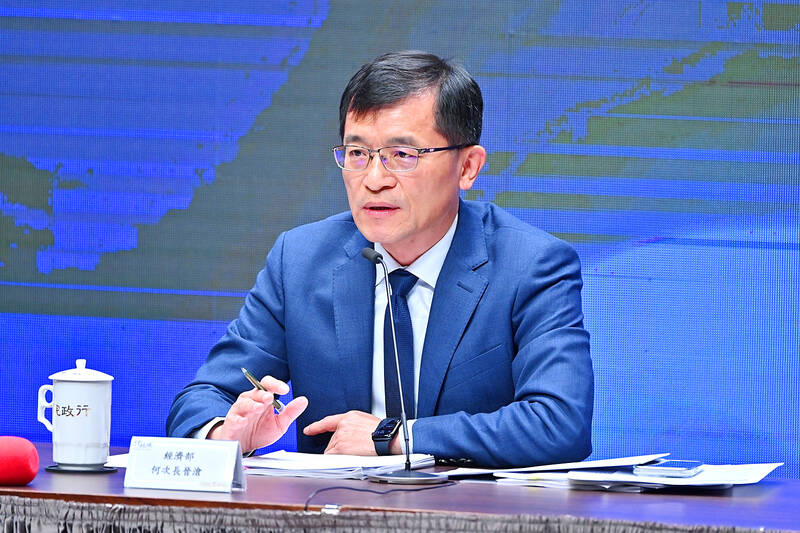The Ministry of Economic Affairs yesterday said certain local industries should position themselves for the effects of the incoming US administration after a report said that US president-elect Donald Trump was considering declaring a national economic emergency to provide a legal ground for his tariff plans.
A CNN report on Wednesday said that Trump was mulling levying new tariffs on all imported goods from allies and adversaries by using the International Economic Emergency Powers Act, which authorizes a president to manage imports during a national emergency.
The news renewed a sense of uncertainty on trading floors across Asia yesterday, with the TAIEX in Taipei sinking 1.39 percent, while other regional markets such as Hong Kong, Shanghai, Tokyo, Sydney, Wellington, Mumbai and Bangkok also moved lower.

Photo courtesy of the Executive Yuan
Deputy Minister of Economic Affairs Ho Chin-tsang (何晉滄) at a news conference after the regular Cabinet meeting yesterday said the possible implementation of new tariffs by the incoming Trump administration might have an impact on Taiwan’s information and communications technology sector, as well as automobile industries.
“We are currently discussing contingency responses with relevant trade associations,” Ho said.
The ministry’s preliminary understanding is that Trump’s potential national economic emergency declaration could mainly affect Taiwan’s auto parts, high-end servers, laptops and desktops destined for the US market, compared with other products, he said.
The ministry has been in close contact with firms and trade associations in the two industries and would discuss the details with industry players after the new US government officially announces the content of its policy, Ho said.
The ministry would also discuss with trade associations to assist firms willing to invest in the US to address the tariff issue, he said.
Following the US presidential election on Nov. 5 last year, Vice Premier Cheng Li-chun (鄭麗君) has headed a task force in charge of trade and technology exchanges with the new US administration.
Cabinet spokesperson Michelle Lee (李慧芝) at yesterday’s news conference said that the task force still holds meetings on a regular basis and would unveil more details about its responses after Trump takes office on Jan. 20.

The US dollar was trading at NT$29.7 at 10am today on the Taipei Foreign Exchange, as the New Taiwan dollar gained NT$1.364 from the previous close last week. The NT dollar continued to rise today, after surging 3.07 percent on Friday. After opening at NT$30.91, the NT dollar gained more than NT$1 in just 15 minutes, briefly passing the NT$30 mark. Before the US Department of the Treasury's semi-annual currency report came out, expectations that the NT dollar would keep rising were already building. The NT dollar on Friday closed at NT$31.064, up by NT$0.953 — a 3.07 percent single-day gain. Today,

‘SHORT TERM’: The local currency would likely remain strong in the near term, driven by anticipated US trade pressure, capital inflows and expectations of a US Fed rate cut The US dollar is expected to fall below NT$30 in the near term, as traders anticipate increased pressure from Washington for Taiwan to allow the New Taiwan dollar to appreciate, Cathay United Bank (國泰世華銀行) chief economist Lin Chi-chao (林啟超) said. Following a sharp drop in the greenback against the NT dollar on Friday, Lin told the Central News Agency that the local currency is likely to remain strong in the short term, driven in part by market psychology surrounding anticipated US policy pressure. On Friday, the US dollar fell NT$0.953, or 3.07 percent, closing at NT$31.064 — its lowest level since Jan.

The New Taiwan dollar and Taiwanese stocks surged on signs that trade tensions between the world’s top two economies might start easing and as US tech earnings boosted the outlook of the nation’s semiconductor exports. The NT dollar strengthened as much as 3.8 percent versus the US dollar to 30.815, the biggest intraday gain since January 2011, closing at NT$31.064. The benchmark TAIEX jumped 2.73 percent to outperform the region’s equity gauges. Outlook for global trade improved after China said it is assessing possible trade talks with the US, providing a boost for the nation’s currency and shares. As the NT dollar

The Financial Supervisory Commission (FSC) yesterday met with some of the nation’s largest insurance companies as a skyrocketing New Taiwan dollar piles pressure on their hundreds of billions of dollars in US bond investments. The commission has asked some life insurance firms, among the biggest Asian holders of US debt, to discuss how the rapidly strengthening NT dollar has impacted their operations, people familiar with the matter said. The meeting took place as the NT dollar jumped as much as 5 percent yesterday, its biggest intraday gain in more than three decades. The local currency surged as exporters rushed to